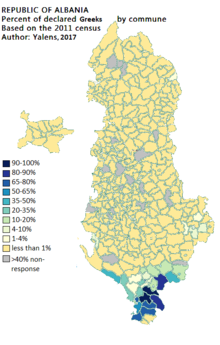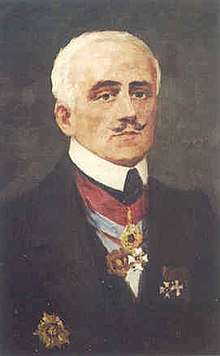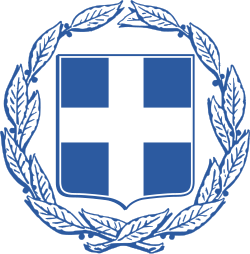Greeks in Albania
The Greeks of Albania are ethnic Greeks who live in or originate from areas within modern Albania. They are mostly concentrated in the south of the country, in the areas of the northern part of the historical region of Epirus, in parts of Vlorë County,[5] Gjirokastër, Korçë[6] and Berat County.[7] The area is also known as Northern Epirus. Consequently, the Greeks hailing specifically from South Albania/Northern Epirus are widely known as Northern Epirotes (Greek: Βορειοηπειρώτες Vorioipirotes, Albanian: Vorioepirot). The Greeks who live in the "minority zones" of Albania are officially recognised by the Albanian government as the Greek National Minority of Albania (Greek: Ελληνική Μειονότητα στην Αλβανία, Elliniki Mionotita stin Alvania; Albanian: Minoriteti Grek në Shqipëri).[8][9]
| Total population | |
|---|---|
| est. over 215,000 (Greeks of southern Albania/Northern Epirus) Greeks of southern Albania/Northern Epirus (including those of ancestral descent) | |
| Regions with significant populations | |
| Albania, Greece, United States, Australia | |
| Albania and Greece | est. over 200,000[1][2][3] |
| United States | over 15,000 (est. 1965)[4] |
| Languages | |
| Greek also Albanian and English depending on the residing place | |
| Religion | |
| Orthodox Christianity | |
In 1913, after the end of five centuries of Ottoman rule, the area was included under the sovereignty of the newly founded Albanian state. The following year, Greeks revolted and declared their independence, and with the following Protocol of Corfu the area was recognised as an autonomous region under nominal Albanian sovereignty. However, this was never implemented.
In modern times, the Greek population has suffered from the prohibition of the Greek language if spoken outside the recognised so-called "minority zones" (which have remained after the communist era) and even limitations on the official use of its language within those zones.[10] According to Greek minority leaders, the existence of Greek communities outside the "minority zones" is even outright denied.[11] Many formerly Greek place-names have been officially changed to Albanian ones.[12] Greeks from the "minority zones" were also frequently forcibly moved to other parts of the country since they were seen as possible sources of dissent and ethnic tension. During communist rule many Greek members of Albanian political parties were forced to cut off their ties with the Orthodox Church.[10] In more recent times, the numbers of the minority have dwindled.
Both Albania and Greece hold different and often conflicting estimations, as they have done so for the last 20 years.[13] In addition, the Greek National Minority of Albania also holds a different view, with the most recent so called "Greek census" in Albania by the group Omonoia putting the number at 287,000 (within southern Albania and some parts of Greece only). This census is not recognised by the Albanian government.[14] The total resident Greek population in Albania, both historically and presently is around 300,000 by modest estimates. In addition 189,000 reside in Greece who are also Albanian nationals, and hold special status in Greece as 'Greeks of Albania’. The numbers may be higher when considering intermarriages, assimilation and wider diaspora.[15]
Northern Epirus
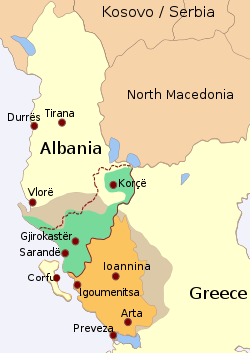
The Greek minority in Albania is concentrated in the south of the country, along the border with Greece, an area referred to by Greeks as "Northern Epirus". The largest concentration is in the districts of Sarandë, Gjirokastër (especially in the area of Dropull), Delvinë and in Himara (part of the district of Vlorë). Smaller groups can be found in the districts of Kolonjë, Përmet and Korçë. In addition, Greek communities are found in all the large cities of Albania, including the capital Tiranë, Fier, Durrës, Elbasan and Shkodër.[16] In more recent times, the numbers of the minority have dwindled. According to an estimate in 2005 more than 80% have migrated to Greece.[17] However, in more recent years the majority of emigrants holding Albanian citizenship in general dropped and many of them eventually returned from Greece to Albania.[18] As a result, in regions such as Himara, part of the ethnic Greek communities that initially moved to Greece have returned.[19]
Recognised Greek "minority zone"
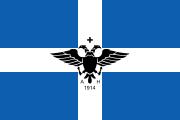
During the communist government (1945–1991), Enver Hoxha, in order to establish control over the areas populated by the Greek minority, declared the so-called "minority zones" (Albanian: Zona e minoritarëve), consisting of 99 villages in the southern districts of Gjirokastër, Sarandë and Delvina.[21]
Tirana's official minority policy defines the Greek origin of Albanian citizens according to the language, religion, birth and ancestors originating from the areas of the so-called "minority zones". The Albanian law on minorities acknowledges the rights of the Greek minority only to those people who live in the areas which are recognized as minority zones. The last census that included ethnicity, from 1989, included only the numbers of the Greek minority in the minority zones.[10] Ethnic Greeks living outside those areas were not counted as such. This has had a practical effect in the area of education: With the exception of the officially recognized Greek minority zones, where teaching was held in both the Greek and Albanian languages, in all other areas of Albania lessons were taught only in the Albanian language.[22]
Albanian PM Edi Rama in 2013 stated the Greek minority is not isolated within the "minority zones" but "all over the nation"[23][24]
Aromanians
A substantial number of Vlachs (Aromanians) in the region have historically self-identified as Greeks.[25] They are mostly concentrated in the southern part of the country in the districts of Sarandë, Vlorë, Fier, Gjirokastër, Përmet, Tepelenë, Devoll and Korçë.[26] Vickers suggests that a certain number of them have claimed to be Greek in exchange for benefits such as Greek pensions, Greek Passports and visas.[25][27][28]
Other Greek communities in Albania
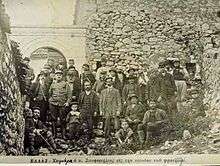
However, the official Albanian definition about minorities did not recognize as members of a minority ethnic Greeks who live in mixed villages and towns inhabited by both Greek and Albanian speaking populations, even in areas where ethnic Greeks form a majority (e.g. Himara).[10][29] Consequently, the Greek communities in Himarë, Korce, Vlorë and Berat did not have access to any minority rights.[30][31]
Contrary to the official Albanian definition, which generally provides a limited definition of the ethnic Greeks living in Albania, Greek migration policy defines the Greek origin on the basis of language, religion, birth and ancestors from the region called Northern Epirus. In that way, according to the Greek State Council, the Greek ethnic origin can be granted on the basis of cultural ancestry (sharing "common historical memories" and/or links with "historic homelands and culture"), Greek descent (Greek Albanians have to prove that the birthplace of their parents or grandparents is in Northern Epirus), language, and religion.[30]
Albanian sources often use the pejorative term filogrek (pro-Greek) in relation to ethnic Greeks, usually in a context disputing their Greek ancestry.[32]
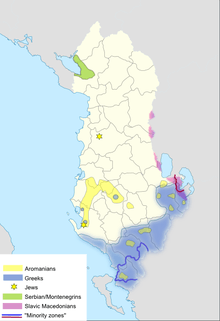
The Greek minority in Albania is located compactly, within the wider Gjirokastër and Sarandë regions[33][34][35][36] and in four settlements within the coastal Himarë area[33][34][35][36][37] where they form an overall majority population.[33][38] Greek speaking settlements are also found within Përmet municipality, near the border.[39][40] Some Greek speakers are also located within the wider Korçë region.[41] Due to both forced and voluntary internal migration of Greeks within Albania during the communist era,[36][42] some Greek speakers are also located within the wider Përmet and Tepelenë regions.[36] Outside the area defined as Northern Epirus, two coastal Greek speaking villages exist near Vlorë; Nartë and Zvërnec.[43][44] While due to forced and non-forced internal population movements of Greeks within Albania during the communist era,[36][42] some Greek speakers are also dispersed within the wider Berat,[45] Durrës, Kavajë, Peqin, Elbasan and Tiranë regions.[36]
Human rights violations in Albania
Human rights in Albania are violated by the Government which have targeted the Greek population via police and secret service according to Human Rights organisations.[46] Greek communities have been targeted by development projects and had their homes demolished in alleged ethnic targeting of Greeks from Southern Albania.[47] Also, according to Amnesty International there were cases of mistreatment of members of Greek minority by the authorities.[48]
Also, the ethnic Greek minority complained about the government's unwillingness to recognize ethnic Greek towns outside communist-era "minority zones," to utilize Greek in official documents and on public signs in ethnic Greek areas, or to include more ethnic Greeks in public administration.[49][50][51][52][53][54][55][56][57]
The 2012 USA annual report mention that the emergence of strident nationalist groups like the Red and Black Alliance (RBA) increased ethnic tensions with the Greek minority groups.[53]
Diaspora
Greece
At the end of the Second World War, approximately 35,000 Northern Epirotes found refuge in Greece.
Since the collapse of the communist regime in Albania in 1990, an estimated 200,000 ethnic Greeks from Albania are believed to live and work (some of them on a seasonal basis) in Greece as immigrants.[60] They are considered 'omogeneis' (co-ethnics) by the Greek Ministry of the Interior and have received special residency permits available only to members of the Greek minority from Albania.[61]
North America
A number of Northern Epirotes have migrated since the late 19th century to the Americas, and are generally integrated in the local Greek-American communities. The Pan-Epirotic Union of America, an organization which consists of 26 branches in various cities, according to its estimates counted nearly 30,000 Northern Epirotes in North America in 1919.[62]
According to post-war sources, Northern Epirotes in America numbered over 15,000 families in 1965.[4]
Australia
Northern Epirotes also emigrated to Australia, where they are active in raising political issues related to their motherland and the rights of the Greek populations still living there.[63] The largest number of such persons are in the state of Victoria.
Culture
Language

The Greek dialects of Albania mainly belong to the branch of southern Greek dialects.[64] In addition to Albanian loanwords, they retain some archaic forms and words that are no longer used in Standard Modern Greek, as well as in the Greek dialects of southern Epirus. Despite the relatively small distances between the various town and villages, there exists some dialectal variation,[65] most noticeably in accent.[30] Though Northern Epirote is a southern dialect, it is located far north of the reduced unstressed vowel system isogloss with the archaic disyllabic -ea. Thus, the provenance of the dialect ultimately remains obscure.[64]
The local Greek dialects (especially the idioms of Chimariotic and the Argyrokastritic) are a more conservative Greek idiom (similarly to that spoken in the Mani peninsula in Greece, and the Griko language of Apulia in Italy),[66] because they were spoken by populations living under virtual autonomy during Ottoman rule due to the rugged nature of the region. Thus, separated from other Greek dialects, the Northern Epirote Greek dialects underwent slower evolution, preserving a more archaic and faithful picture of the medieval Greek vernacular. The isolation of Albania during the years of communist rule, which separated the Greeks living in Albania from other Greek communities, also contributed to the slower evolution and differentiation of the local Greek dialects.
The dialects of Nartë and Zvërnec belong to the branch of northern Greek dialects.[67]
Decent knowledge of Albanian is also common amongst the Greek minority; almost all Greeks who have grown up living in Albania are bilingual.[68]
Music

Epirote folk music has several unique features not found in the rest of the Greek world. Singers from the Pogon region (as well as in the Greek part of Upper Pogoni) perform a style of polyphony that is characterized by a pentatonic structure, and also appears in the music of nearby Albanian and Vlach populations.[69] Another type of polyphonic singing in the region seems to have features in common with the lament songs (Greek: Μοιρολόγια) sung in some parts of Greece.[70] The female lament singing of Greeks in Albania is similar in nature and performance with that of the Mani peninsula in Greece.[71] In recent years there has been a growing interest in polyphonic music from this region, most notably by the musician Kostas Lolis, born near Sopik in Albania but now lives in Ioannina, in Greece.
Religion
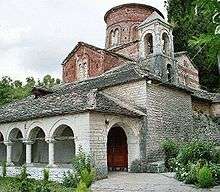
Christianity spread in the late Roman Empire, and throughout much of Medieval and Modern history, the Christian faith has been a significant part of the identity of Greeks in what became Albania and elsewhere. After the Great Schism, Albania was divided between the Western (Catholic) and Eastern (Orthodox) rites, with much of the Southern regions where Greeks resided being loyal to the Orthodox rite. During the Ottoman era, the Orthodox population, to which most Greeks belonged, was treated according to the Ottoman millet system which privileged Muslims and disadvantaged Christians as second class citizens who received fewer political, social, and economic rights.[73] Orthodox Christianity during the Ottoman period remained dominant in many areas and became an important reason for preserving the Greek language, which was also the language of trade.[74][75] In Himara, during part of this period, the local Greek population were Catholics of the Eastern rite due to alliances with Western and Catholic European powers,[73] although they reverted to Greek Orthodoxy ultimately. Greek-Orthodox missionary Cosmas of Aetolia traveled across much of Southern Albania in a mission to preserve the Orthodox faith there, and was executed as a Russian agent in the process.[76] Due to reforms in the late Ottoman Empire and its ultimate collapse, legal discrimination against Christians in favor of Muslims was reduced and ceased entirely in the late 19th and early 20th centuries.
Under the People's Republic of Albania, the Orthodox faith adhered to by most ethnic Greeks was banned entirely alongside the other religious faiths all over the country. The process started in 1949, with the confiscation and nationalisation of Church property and further intensified in 1967, when the state launched its atheistic campaign.[77][78] However, some private practice managed to survived.[79] This campaign was also part of the state persecution against the identity of the Greek people; as many of their traditions were closely related to Eastern Christianity.[80]
The ban was lifted in 1990 just in time for Christians to observe traditional Christmas rites.[81] Thus, one of the first Orthodox masses was celebrated in the town of Dervican on 16 December of that year.[82]
Education
Ottoman era
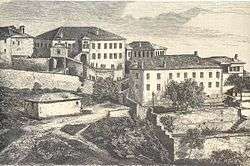
During the first period of Ottoman occupation, illiteracy was a main characteristic of the wider Balkan region, but contrary to that situation, Epirus was not negatively affected. Along with the tolerance of the Turkish rulers and the desires of wealthy Epirote emigrants in the diaspora, many schools were established.
The spiritual and ethnic contribution of the monastery schools in Epirus such as Katsimani (near Butrint), Drianou (in Droviani), Kamenas (in Delvina) and St. Athanasios in Poliçani (13th-17th century) was significant. The first Greek-language school in Delvine was founded in 1537,[83] when the town was still under Venetian control, while in Gjirokastër a Greek school was founded in 1633.[4] The most important impetus for the creation of schools and the development of Greek education was given by the Orthodox missionary Cosmas of Aetolia together with the Aromanian Nektarios Terpos from Moscopole.[84][85] Cosmas the Aetolian founded the Acroceraunian School, harkening back to the region's name in classical antiquity, in the town of Himara in 1770.
In Moscopole, an educational institution known as the "New Academy" (Greek: Νέα Ακαδημία) and an extensive library were established during the 18th century. A local Epirote monk founded in 1731 the first printing-press in the Balkans (second only to that of Constantinople). However, after the destruction of Moscopole (1769), the center of Greek education in the region moved to nearby Korçë.[4]
In the late 19th century, the wealthy banker Christakis Zografos founded the Zographeion College in his hometown of Qestorat, in the region of Lunxhëri.[32] Many of the educated men that supported Greek culture and education in the region, then the culture of the Orthodox Patriarchate, were Vlachs by origin. In 1905, Greek education was flourishing in the region, as the entire Orthodox population, including Orthodox Albanians, were educated in Greek schools.[86]
| Sandjak | District | No. of Greek schools |
Pupils |
|---|---|---|---|
| Monastir | Korce | 41 | 3,452 |
| Kolonje | 11 | 390 | |
| Leskovik | 34 | 1,189 | |
| Gjirokastër | Gjirokastër | 50 | 1,916 |
| Delvine | 24 | 1,063 | |
| Permet | 35 | 1,189 | |
| Tepelene | 18 | 589 | |
| Himare | 3 | 507 | |
| Pogon | 42 | 2,061 | |
| Berat | Berat | 15 | 623 |
| Skrapar | 1 | 18 | |
| Lushnjë | 28 | 597 | |
| Vlore | 10 | 435 | |
| Durrës | Durrës | 3 | 205 |
| Total | 315 | 14,234 |
However, in the northernmost districts of Berat and Durrës, the above numbers do not reflect the ethnological distribution, because a large number of students were Orthodox Albanians.[87]
20th century Albania (1912–1991)
When Albania was created in 1912, the educational rights of the Greek communities in Albanian territory were granted by the Protocol of Corfu (1914) and with the statement of Albania's representatives in the League of Nations (1921). However, under a policy of assimilation, the Greek schools (there were over 360 until 1913) were gradually forced to close and Greek education was virtually eliminated by 1934. Following the intervention by the League of Nations, a limited number of schools, only those inside the "official minority zones", were reopened.[32][88]
During the years of the communist regime, Greek education was also limited to the so-called "minority zone", in parts of the districts of Gjirokastër, Delvina and Sarande, and even then pupils were taught only Albanian history and culture at the primary level.[10] If a few Albanian families moved into a town or village, the minority's right to be educated in Greek and publish in Greek newspapers was revoked.[16]
Post cold war period (1991–present)
One of the major issues between the Albanian government and the Greek minority in Albania is that of education and the need for more Greek-language schools, due to overcrowded classrooms and unfulfilled demand. In addition, the Greek minority remands that Greek language education be made available outside the "official minority zones". In 2006, the establishment of a Greek-language university in Gjirokastër was agreed upon after discussions between the Albanian and Greek government.[89] Also in 2006, after years of unanswered demands by the local community, a private Greek-language school opened in the town of Himarë,[90] at the precise location where the Orthodox missionary Cosmas the Aetolian founded the Acroceraunian School.[91] The school currently has five teachers and 115 pupils. The Albanian government systematically persecutes Greek communities using mandatory demolition orders, further provocation has come on issuing the demolition orders on Greek national holidays. These are often under the proviso of development but only effect ethnic Greeks and restrict and target educational buildings.[92][93]
Benefaction
A number of people from the prosperous Northern Epirote diaspora of the 18th-19th centuries made significant contributions not only to their homeland, but also to the Greek state and to the Greek world under Ottoman Turkish domination. They donated fortunes for the construction of educational, cultural and social institutions. The Sinas family supported the expansion of the University of Athens and sponsored the foundation of the National Observatory. Ioannis Pangas from Korcë gave all of his wealth for educational purposes in Greece.[88] The Zappas brothers, Evangelos and Konstantinos, endowed Athens with an ancient Greek-style marble stadium (the Kallimarmaro) that has hosted Olympic Games in 1870,[94] 1875, 1896, 1906 and 2004, and the Zappeion exhibition center. The Zappas brothers also founded a number of hospitals and schools in Athens and Constantinople.[4] Christakis Zografos in the Ottoman capital offered vast amounts of money for the establishments of two Greek schools (one for boys, known as Zographeion Lyceum, as well as one for girls), and a hospital.[95]
Organizations
Albania
During the years of communist rule, any form of organization by minorities was prohibited.[96] In 1991, when the communist regime collapsed, the political organization Omonoia (Greek: Ομόνοια) was founded, in the town of Dervican by representatives of the Greek minority. The organization has four affiliates, in Sarandë, Delvinë, Gjirokastër and Tirana, and sub-sections in Korçë, Vlorë and Përmet. Its leading forum is the General Council consisting of 45 members, which is elected by the General Conference held every two years.[97]
The Chair of Omonoia called for the autonomy of Northern Epirus in 1991, on the basis that the rights of the minority under the Albanian constitution were highly precarious. This proposal was rejected and thereby spurred the organization's radical wing to "call for Union with Greece".[96]
Omonoia was banned from the parliamentary elections of March 1991 on the grounds that it violated an Albanian law forbidding the "formation of parties on a religious, ethnic and regional basis". This situation was contested during the following elections on behalf of Omonoia by the Unity for Human Rights Party – a party which represents the Greek minority in the Albanian parliament. Omonoia still exists as an umbrella social and political organization, and represents approximately 100,000 to 150,000 ethnic Greeks.[32]
Omonoia has been the center of more than one political controversy in Albania. A major political controversy erupted in 1994 when five ethnic Greek members of Omonoia were arrested, investigated, and tried for treason. Their arrest was substantially marred by procedural shortcomings in the search of their homes and offices, their detention, and their trial. None of the arrestees had access to legal counsel during their initial detention. Four of the five ethnic Greek members of Omonoia stated that, during their detention, authorities subjected them to physical and psychological pressure, including beatings, sleep deprivation, and threats of torture. The Albanian Government rejected these claims. The five ethnic Greeks also complained of lack of access to their families during the first 3 months of their 4-month investigation. During their trial, a demonstration by a group of about 100 Greek lawyers, journalists, and ethnic Greek citizens of Albania took place outside the courthouse. The Albanian Police violently broke up the protest and detained about 20 lawyers and journalists. The members of Omonoia were eventually sentenced to 6 to 8-year prison terms, which were subsequently reduced on appeal.[21][98]
North America
The Panepirotic Federation of America (Greek: Πανηπειρωτική Ομοσπονδία Αμερικής) was founded in Worcester, Massachusetts, in 1942, by Greek immigrants from Epirus (both from the Greek and Albanian part). One of the organization's main goals has been the protection of the human rights of the Greek minority in Albania[99] and to call on the Albanian Government to enhance its full acceptance within the community of responsible nations by restoring to the Greek minority its educational, religious, political, linguistic and cultural rights due them under bilateral and international agreements signed by Albania's representatives since the country was created in 1913, including the right to declare their ethnic and religious affiliation in a census monitored by international observers.[100]
The organization played and still plays essential part in promoting the Northern Epirote issue. It is claimed that the Albanian-American relations worsened in 1946 due to successful lobbying by the Panepirotic Federation in promoting the Northern Epirote issue among American political circles. Albanian leader Enver Hoxha, opposing the restoration of an autonomous Northern Epirus, decided not to pursue diplomatic relations with the United States.
Australia
The Panepirotic Federation of Australia (Greek: Πανηπειρωτική Ομοσπονδία Αυστραλίας) was founded in 1982 as a Federation of various organizations representing migrants who originated from the region of Epirus throughout Australia. It is known for its dedication to the maintenance and development of Epirotic culture in Australia, its passionate championing of the rights of the Greek minority of Northern Epirus, and plays a prominent role in the life of the Greek community in Australia. It has donated over one million dollars to works of a charitable and philanthropic nature for the Greeks of Northern Epirus. It is also affiliated with the World Council of Epirotes Abroad and the World Council of Hellenes Abroad.
The Panepirotic Federation of Australia's former president, Mr Petros Petranis has notably completed a study of Epirotic migration to Australia, which is titled "Epirots in Australia" (Greek: Οι Ηπειρώτες στην Αυστραλία), published by the National Centre for Hellenic Studies, LaTrobe University, in 2004.
Notable people
For the ancient Greeks who lived in the region, see Chaones.
Academics
- Charles Moskos (1934–2008), sociologist and professor.
- Dimitris Nanopoulos (1948- ), world-renowned physicist, of a Northern Epirotian[101] descent.
- Vasileios Ioannidis (1869–1963), theologian.
- Tasos Vidouris (1888–1967), professor and poet.
Literature and art
- Stavrianos Vistiaris, 16th century poet.
- Kosmas Thesprotos (1780–1852)
- Konstantinos Skenderis, journalist, author and member of the Greek Parliament (1915–1917) for the Korytsa Prefecture.
- Theophrastos Georgiadis (1885–1973), author.
- Katina Papa (1903–1959), author.
- Michael Vasileiou, entrepreneur and scholar.
- Theodosios Gousis, painter.
- Konstantinos Kalymnios, poet.
- Takis Tsiakos (1909–1997), poet.
- Rita Wilson, actress and producer.
- Laert Vasili, actor and director.
- Vassilis K. Pappas (b. 1958), poet.
Military/resistance
- Konstantinos Lagoumitzis (1781–1827), revolutionary.
- Kyriakoulis Argyrokastritis (-1828), revolutionary.
- Michail Spyromilios (1800–1880), army General, military advisor and politician.
- Zachos Milios (1805–1860) army officer.
- Ioannis Poutetsis (-1912) revolutionary.
- Spyros Spyromilios (1864–1930) Gendarmerie officer.
- Dimitrios Doulis (1865–1928), army officer, minister of military affairs of the Autonomous Rep. of Northern Epirus.
- Nikolaos Dailakis ( -1941) revolutionary of the Macedonian Struggle.
- Vasilios Sahinis (1897–1943), leader of the Northern Epirote resistance (1942–1943).
Philanthropy
- Alexandros Vasileiou (1760–1818)
- Ioannis Dombolis (1769–1849)
- Apostolos Arsakis (1792–1874)
- Evangelis Zappas (1800–1865)
- Konstantinos Zappas (1814–1892)
- Ioannis Pangas (1814–1895)
- Georgios Sinas (1783–1856)
- Simon Sinas (1810–1876)
- Christakis Zografos (1820–1896)
Politics
- Thanasis Vagias (1765–1834) counselor of Ali Pasha
- Kyriakos Kyritsis lawyer and member of the Greek Parliament (1915–1917) for the Argyrokastron Prefecture.
- Petros Zappas, member of the Greek Parliament (1915–1917) for the Argyrokastron Prefecture.
- Georgios Christakis-Zografos (1863–1920), diplomat, president of the Provisional Government of Northern Epirus (1914).
- Themistoklis Bamichas (1875–1930), politician.
- Mihal Kasso, politician.
- Spiro Koleka (1908–2001), long-serving member of the Politburo of the Party of Labour of Albania, one of the few members of the Greek minority serving in the Socialist People's Republic of Albaniapolitical system.[102]
- Kiço Mustaqi (1938-2019) last chief of general staff in communist Albania
- George Tenet (1953-), former Director of CIA, of Himariot origin.
- Vasil Bollano (1958-), present chairman of Omonoia.
- Spiro Ksera (1967-), current Minister of Labor, Social Affairs and Equal Opportunities of Albania and ex prefect of Gjirokastër County.
Religion
- Sophianos (-1711), bishop of Dryinoupolis and scholar, from Poliçan.
- Nektarios Terpos (fl. 1731–32) monk and scholar, from Moscopole.
- Gavriel Konstantinidis, 18th century, monk, founder of the printing-house in Moscopole (1731).
- Vasileios of Dryinoupolis (1858–1936), bishop and member of the provisional government of Northern Epirus (1914).
- Ioakeim Martianos (1875–1955), bishop and author, from Moscopole.
- Panteleimon Kotokos (1890–1969), bishop of Gjirokastër (1937–1941), from Korçë.
Sports
- Pyrros Dimas, Greek weight-lifer, Olympic medalist, born in Himarë
- Panajot Pano (1939–2010), footballer of Greek origin, born in Durrës
- Ledio Pano, footballer of Greek origin
- Sotiris Ninis, Greek footballer, born in Himarë
- Andreas Tatos, Greek footballer, born in Himarë
- Panagiotis Kone, Greek footballer, born in Tirana
See also
References
- Robert Bideleux; Ian Jeffries (15 November 2006). The Balkans: A Post-Communist History. Routledge. p. 49. ISBN 978-0-203-96911-3. Retrieved 6 September 2013.
The Albanian government claimed that there were only 60,000, based on the biased 1989 census, whereas the Greek government claimed that there were upwards of 300,000. Most Western estimates were around the 200,000 mark ...
- Pettifer, James (2000). The Greeks the land and people since the war. Penguin. ISBN 978-0-14-028899-5.
- Migration and Migration Policy in Greece. Critical Review and Policy Recommendations. Anna Triandafyllidou. Hellenic Foundation for European and Foreign Policy (ELIAMEP). Data taken from Greek ministry of Interiors. p. 3 "Greek co ethnics who are Albanian citizens (Voreioepirotes) hold Special Identity Cards for Omogeneis (co-ethnics) (EDTO) issued by the Greek police. EDTO holders are not included in the Ministry of Interior data on aliens. After repeated requests, the Ministry of Interior has released data on the actual number of valid EDTO to this date. Their total number is 189,000."
- Ruches, Pyrrhus J. (1965). Albania's Captives. Argonaut.
- Petiffer, James (2001). The Greek Minority in Albania – In the Aftermath of Communism (PDF). Surrey, UK: Conflict Studies Research Centre. p. 7. ISBN 1-903584-35-3. Archived from the original (PDF) on 6 July 2011.
- Miranda Vickers, James Pettifer (1997). Albania: from anarchy to a Balkan identity. London: C. Hurst & Co. Publishers. p. 187. ISBN 0-7156-3201-9.
- Winnifrith, Tom (2002). Badlands, Borderlands A History of Northern Epirus-Southern Albania. Gerald Duckworth, Limited. p. 29. ISBN 978-0-7156-3201-7.
- "Ελληνική Δημοκρατία - Υπουργείο Εξωτερικών". Mfa.gr. Retrieved 28 August 2017.
- "Bushati në Francë: bashkëpunim i përforcuar për flukset migratore, sigurinë dhe integrimin". Mfa.gov.al. Archived from the original on 4 December 2000. Retrieved 28 August 2017.
- James Pettifer.The Greek Minority in Albania in the Aftermath of Communism Archived 21 May 2010 at the Wayback Machine. Paper prepared for the British MoD, Defence Academy, 2001. ISBN 1-903584-35-3.
- "Archived copy". Archived from the original on 19 January 2012. Retrieved 24 June 2017.CS1 maint: archived copy as title (link)
- Nußberger Angelika, Wolfgang Stoppel (2001). "Minderheitenschutz im östlichen Europa (Albanien)" (PDF) (in German). p. 21: Universität Köln. Archived (PDF) from the original on 3 March 2016. Retrieved 23 April 2015. Cite journal requires
|journal=(help)CS1 maint: location (link) - ""Northern Epiros": The Greek Minority in Southern Albania – Cultural Survival". Culturalsurvival.org. Retrieved 28 August 2017.
- "OMONIA's Census: Greek minority constitutes 10% of population in Albania". Balkaneu.com. 11 December 2013. Retrieved 28 August 2017.
- Miranda Vickers. "Balkans Series : The Greek Minority in Albania : Current Tensions" (PDF). Voltairenet.org. Retrieved 28 August 2017.
- Vance, Charles; Paik, Yongsun (2006). Managing a Global Workforce Challenges and Opportunities in International Human Resource Management. M.E. Sharpe. p. 682. ISBN 978-0-7656-2016-3.
- Kalekin-Fishman, Devorah; Pitkänen, P. (2006). Multiple Citizenship as a Challenge to European Nation-States. Sense Publishers. p. 148. ISBN 978-90-77874-86-8.
- Sasin, edited by Edmundo Murrugarra, Jennica Larrison, Marcin (2010). Migration and poverty : toward better opportunities for the poor. Washington, D.C.: World Bank. p. 75. ISBN 978-0-8213-8436-7.CS1 maint: extra text: authors list (link)
- McAdam, Marika (2009). Western Balkans (2nd ed.). Footscray, Vic.: Lonely Planet. p. 85. ISBN 978-1-74104-729-5.
- Minahan, James (2002). Encyclopedia of the Stateless Nations: Ethnic and National Groups Around the World A-Z [4 Volumes]. ABC-CLIO. p. 577. ISBN 978-0-313-07696-1.
The Epirote Greek national flag, the flag of the former republic, is a white field outlined in pale blue and bearing a broad pale blue cross charged with a small, black double-headed Epirote eagle centered. The flag of the national movement is a blue field divided by a broad white cross centered behind a black, double0headed eagle, wings spread...
- U.S. Department of State – Country Reports on Human Rights Practices for 1994:Albania
- Advisory Committee on the Framework Convention for the Protection of National Minorities: Second Opinion on Albania, 29 May 2008. Council of Europe: Secretariat of the Framework Convention for the Protection of National Minorities.
- "Archived copy". Archived from the original on 4 March 2016. Retrieved 5 September 2015.CS1 maint: archived copy as title (link) /
- Zikakou, Ioanna. "Albania: Edi Rama Acknowledges Greeks of Himara – Greek Reporter Europe". Eu.greekreporter.com. Retrieved 28 August 2017.
- Kitsaki, Georgia (2011). "Ethnic groups:Identities and relationships in the Greek-Albanian border". In Nitsiakos, Vassilis (ed.). Balkan border crossings: Second annual of the Konitsa Summer School. Lit Verlag. p. 151. ISBN 978-3-643-80092-3.CS1 maint: ref=harv (link) "The recent socio-political changes in Albania have brought on this change. Work in Greece is of vital importance, so in order to acquire entry or a work permit in Greece, you have to declare being a member of the Greek Minority or prove your ‘Greek origin’, which has acquired tremendous social and economic value in Albania. Different identity cards were provided by the Greek state to ‘Greeks by descent’ (homogeneis), i.e. to Albanian citizens claiming Greek origin. A great number of Vlachs in the south-east of Albania have also claimed Greek homogeneis identity based on their pro-Greek social networks and identity idioms of the past. There have even been cases of Albanian Muslims who made similar claims by falsifying their Albanian documents. This is the potential effect of Greek policy, since people in Albania believe that that there is discrimination by the Greek state against Muslims or ‘non-Greeks’ in favour of ‘Christians’ or those of ‘Greek origin’."
- Balkan Identities: Nation and Memory. Marii︠a︡ Nikolaeva Todorova. C. Hurst & Co. Publishers, 2004. ISBN 1-85065-715-7
- Konidaris, Gerasimos (2005). "Examining policy responses to immigration in the light of interstate relations and foreign policy objectives: Greece and Albania". In King, Russell; Schwandner-Sievers, Stephanie (eds.). The new Albanian migration. Brighton: Sussex Academic. pp. 84–85. ISBN 978-1-903900-78-9.CS1 maint: ref=harv (link) "An issue that relates to the above is that in recent years Albanian citizens who can demonstrate adequate knowledge of the Vlach language or Vlach cultural heritage have been recognised by Greece of being of Greek origin. They have consequently enjoyed privileged treatment by the Greek consulates in the issuing of visas. Some have argued that this might represent an attempt by Greece to introduce ‘new blood’ to the minority in order to compensate for the loss due to migration (Tsitselikis and Christopoulos 2003:: 30-3). Though some Vlachs can claim descent from Greece (Baltsiotis 2003: 1099; Winnifirth 2002: 26, 164), it is not clear that Greece is trying to create a ‘new minority’. For instance, in the 2001 Albanian elections Greece did not display interest in the electoral procedure in areas with Vlach speaking population (Baltsiotis 2003: 110). Furthermore, it has been argued that many of those who have presented themselves as ‘Helleno-Vlachs’ have done so in order to have access to various benefits (such as working vises and scholarships) rather than because they have a distinguishing Greek identity (Baltsiotis 2003: 89-109 Christopoulos 2003: 147-8; Schwander-Sivers 1999)."
- Vickers, Miranda (January 2010). "Balkans Series. The Greek Minority in Albania – Current Tensions" (PDF). Defence Academy of the United Kingdom. Archived from the original (PDF) on 5 March 2012. Retrieved 22 November 2012.
- Albania: From Anarchy to a Balkan Identity. Miranda Vickers, James Pettifer. C. Hurst & Co. Publishers, 1997. ISBN 1-85065-290-2 "...in practise many villages of ethnic Greeks were unable to obtain minority classification because a few Albanians also lived there.
- Contested Spaces and Negotiated Identities in Dhermi/Drimades of Himare/Himara area, Southern Albania. Archived 10 June 2011 at the Wayback Machine Nataša Gregorič Bon. Nova Gorica 2008.
- Winnifrith, Tom (2002). Badlands, Borderlands A History of Northern Epirus-Southern Albania. Gerald Duckworth, Limited. ISBN 978-0-7156-3201-7.
- King, Russell; Mai, Nicola; Schwandner-Sievers, Stephanie (2005). The New Albanian Migration. Sussex Academic Press. ISBN 978-1-903900-78-9.
- Nitsiakos, Vassilis (2010). On the border: Transborder mobility, ethnic groups and boundaries along the Albanian-Greek frontier. LIT Verlag. p. 99. "According to the latest census in the area, the Greek-speaking population is larger but not necessarily continuous and concentrated. The exclusively Greek-speaking villages, apart from Himarë, are Queparo Siperme, Dhërmi and Palasë. The rest are inhabited by Albanian-speaking Orthodox Christians (Kallivretakis 1995:25-58)."; pp. 129-130. "The Greek minority of Albania is found in the southern part of the country and it mostly constitutes a compact group of people. Apart from the cities (Gjirokastër, Sarandë), whose population is mixed, the villages of these two areas, which are officially recognized as minority areas, are in the vast majority of their population Greek and their historical presence in this geographical space, has led to an identification of the group with this place."
- Winnifrith, 2002, pp. 24-25: "But in spite of the efforts of Greek schools and churches near Vlorë, Berat and Korçë, Greek speech only really exists today in the extreme south-west of Albania near Butrint and along the border as far as Kakavia, in three villages along the coast near Himarë, and in the Drinos valley near Gjirokastër. Even in these areas there are pockets of Albania speech, and almost all Greek-speakers are bilingual. Emigration to Greece has in the past ten years both emptied certain villages and increased the number of Greek-speakers. Pro-Greek feelings may have existed at other opportune times among people who spoke Albanian at home, but were Orthodox in religion and spoke Greek in commercial dealing or at church."
- Kallivretakis, Leonidas (1995). "Η ελληνική κοινότητα της Αλβανίας υπό το πρίσμα της ιστορικής γεωγραφίας και δημογραφίας [The Greek Community of Albania in terms of historical geography and demography Η ελληνική κοινότητα της Αλβανίας υπό το πρίσμα της ιστορικής γεωγραφίας και δημογραφίας. 1995. pp. 25–58. ISBN 9789600800548. Archived from the original on 21 March 2015. Retrieved 26 November 2017.CS1 maint: BOT: original-url status unknown (link)." In Nikolakopoulos, Ilias, Kouloubis Theodoros A. & Thanos M. Veremis (eds). Ο Ελληνισμός της Αλβανίας [The Greeks of Albania]. University of Athens. pp. 51-58.
- Berxholli Arqile, Sejfi Protopapa, & Kristaq Prifti (1994). "The Greek minority in the Albanian Republic: A demographic study". Nationalities Papers. 22. (2): 430. "Another factor contributing to the lower rate of increase in the Greek minority is the internal movement of the ethnic Greeks. The women who marry non-Greeks outside the minority areas often give up their Greek nationality. The same thing can be said about the ethnic Greeks, especially those with university training, who would be employed outside their villages. In particular, those working in large cities like Tirana very often would not declare their Greek nationality."; p. 431: "As can be seen from Table I, the preponderant number of Greek nationals, 57,602, live in southern Albania, south of the Shkumbin River. Only 1,156 ethnic Greeks reside outside of this region, principally in the cities of Tirana, Durres and Elbasan. Thus, in southern Albania, with an area of 13,000 square kilometers and a population of 1,377,810, the Greek minority makes up 4.18 percent of the overall population. But the highest concentration of the Greek minority is located in an area of I ,000 square kilometers in the enclaves of Pogon, Dropull and Vurg, specifically, the townships of Lower Dropull, Upper Dropull and Pogon, in the district of Gjirokastra; the townships of Vergo, Finiq, Aliko, Mesopotam and the city of Delvina in the district of Delvina; and the townships of Livadhja, Dhiver and the city of Saranda, in the district of Saranda. This concentration has a total population of 53,986 ethnic Greeks. In turn, these enclaves are within the districts of Gjirokastra, Delvina and Saranda, with an area of 2,234 square kilometers which contains a total of 56,452 ethnic Greeks, or 36.6 percent of the general population of 154,141 in the region."
- Winnifrith, Tom (1995). "Southern Albania, Northern Epirus: Survey of a Disputed Ethnological Boundary Archived 2015-07-10 at the Wayback Machine". Farsarotul. Retrieved 14 June 2015.
- "Albania: The state of a nation". ICG Balkans Report N°111. p. 15. Archived from the original (PDF) on 8 August 2010. Retrieved 2 September 2010.
The coastal Himara region of Southern Albania has always had a predominantly ethnic Greek population.
- Dimitropoulos, Konstantinos (2011). Social and political policies regarding Hellenism in Albania during the Hoxha period Archived 11 July 2015 at the Wayback Machine (Thesis). Panteion University of Social and Political Sciences. p. 11.
- Nitsiakos. On the border. 2010. pp. 249-263
- Winnifrith, 2002, p. 133.
- p. 6. "In contrast, Albanian governments use a much lower figure of 58,000 which rests on the unrevised definition of "minority" adopted during the communist period. Under this definition, minority status was limited to those who lived in 99 villages in the southern border areas, thereby excluding important concentrations of Greek settlement in Vlora (perhaps 8000 people in 1994) and in adjoining areas along the coast, ancestral Greek towns such as Himara, and ethnic Greeks living elsewhere throughout the country. Mixed villages outside this designated zone, even those with a clear majority of ethnic Greeks, were not considered minority areas and therefore were denied any Greek-language cultural or educational provisions. In addition, many Greeks were forcibly removed from the minority zones to other parts of the country as a product of communist population policy, an important and constant element of which was to pre-empt ethnic sources of political dissent. Greek place-names were changed to Albanian names, while use of the Greek language, prohibited everywhere outside the minority zones, was prohibited for many official purposes within them as well."
- Nicholas Geoffrey Lemprière Hammond (1967). Epirus: the Geography, the Ancient Remains, the History and Topography of Epirus and Adjacent Areas. Clarendon Press. pp. 131-132.
- Dimitropoulos. Social and political policies regarding Hellenism. 2011. p. 13.
- Winnifrith, 2002, p. 29: "Berat was the seat of a Greek bishopric... and today Vlach- and even Greek-speakers can be found in the town and the villages near by".
- "Albania: The Greek Minority". Human Rights Watch. Retrieved 28 August 2017.
- "Οι Αλβανοί αρπάζουν σπίτια από τους Βορειοηπειρώτες". Himara.gr. Retrieved 28 August 2017.
- ALBANIA: FAILURE TO END POLICE ILL-TREATMENT AND DEATHS IN CUSTODY
- United States Department of State ALBANIA 2008 HUMAN RIGHTS REPORT]
- United States Department of State ALBANIA 2009 HUMAN RIGHTS REPORT]
- ALBANIA 2010 HUMAN RIGHTS REPORT
- ALBANIA 2011 HUMAN RIGHTS REPORT
- ALBANIA 2012 HUMAN RIGHTS REPORT
- ALBANIA 2013 HUMAN RIGHTS REPORT
- ALBANIA 2014 HUMAN RIGHTS REPORT
- ALBANIA 2015 HUMAN RIGHTS REPORT
- ALBANIA 2016 HUMAN RIGHTS REPORT
- "International Religious Freedom Report for 2014: Albania" (PDF). State.gov. United States, Department of State. p. 5. Retrieved 20 October 2015.
Ethnic Greek minority groups had encouraged their members to boycott the census, affecting measurements of the Greek ethnic minority and membership in the Greek Orthodox Church.
- "Final census findings lead to concerns over accuracy". Tirana Times. 19 December 2012. Archived from the original on 26 December 2012.
Portions of the census dealing with religion and ethnicity have grabbed much of the attention, but entire parts of the census might not have been conducted according to the best international practices, Albanian media reports...
- Fassmann, Heinz; Reeger, Ursula; Sievers, Wiebke (2009). Statistics and Reality Concepts and Measurements of Migration in Europe. Amsterdam University Press. p. 240. ISBN 978-90-8964-052-9.
- Migration and Migration Policy in Greece. Critical Review and Policy Recommendations. Anna Triandafyllidou. Hellenic Foundation for European and Foreign Policy (ELIAMEP). Data taken from Greek ministry of Interiors.
- The question of Northern Epirus at the Peace Conference. Archived 21 August 2010 at the Wayback Machine Pan-Epirotic Union of America. Nicolas J. Cassavetis. Oxford University Press American Branch. 1919.
- Tamis, Anastasios M. (2005). The Greeks in Australia. Cambridge University Press. ISBN 978-0-521-54743-7.
- Appendix A. History & Diatopy of Greek. Archived 9 August 2016 at the Wayback Machine The story of pu: The grammaticalisation in space and time of a Modern Greek complementiser. December 1998. University of Melbourne. Nick Nicholas.
- Minahan, James (2002). Encyclopedia of the Stateless Nations S-Z. Greenwood Publishing Group. p. 2002. ISBN 978-0-313-32384-3.
- Appendix A. History & Diatopy of Greek. Archived 9 August 2016 at the Wayback Machine The story of pu: The grammaticalisation in space and time of a Modern Greek complementiser. December 1998. University of Melbourne. Nick Nicholas. p. 504: "Why Himara or Argyrokastro would have been significantly more archaic than any number of mountains in Northern Greece (not counting those where Aroumin is spoken!) is not clear"
- "ΤΟ ΕΛΛΗΝΙΚΟ ΓΛΩΣΣΙΚΟ ΙΔΙΩΜΑ ΤΗΣ ΑΡΤΑΣ ΑΥΛΩΝΑ (The Greek linguistic idiom in Vlorë's Arta)" (PDF). Aristoelean University of Salonica.
- Winnifrith, 2002, pp. 24-25: "But in spite of the efforts of Greek schools and churches near Vlorë, Berat and Korçë, Greek speech only really exists today in the extreme south-west of Albania near Butrint and along the border as far as Kakavia, in three villages along the coast near Himarë, and in the Drinos valley near Gjirokastër. Even in these areas there are pockets of Albania speech, and almost all Greek-speakers are bilingual.
- Plantenga, Bart (2004). Yodel-ay-ee-oooo The Secret History of Yodeling Around the World. Psychology Press. ISBN 978-0-415-93990-4.
- Journal of the American Musicological Society. American Musicological Society. 1959. p. 97.
- Holst-Warhaft, Gail (1992). Dangerous Voices Women's Laments and Greek Literature. Routledge. p. 139. ISBN 978-0-415-07249-6.
- Giakoumis, K. An Enquiry into the Construction, Deconstruction, Transubstantiation and Reconstruction of Christian Pilgrimages in Modern-Day Albania. Page 282
- Frazee, Charles A. (30 June 2006). Catholics and Sultans: The Church and the Ottoman Empire 1453–1923. Cambridge University Press. p. 104. ISBN 978-0-521-02700-7. Retrieved 26 December 2010.
- Winnifrith 2002: p. 108
- Gregorič 2008: 126
-
- Elsie, Robert (2001). A dictionary of Albanian religion, mythology, and folk culture. London: Hurst & Company. pp. 59–60. ISBN 978-1-85065-570-1.CS1 maint: ref=harv (link).
- King, Russell; Mai, Nicola; Schwandner-Sievers, Stephanie (2005). The New Albanian Migration. Sussex Academic Press. p. 68. ISBN 978-1-903900-78-9.
- Miranda Vickers & James Petiffer 1997: "...with the demolition and the subsequent demolition of many churches, burning of religious books… general human rights violations. Christians could not mention Orthodoxy even in their own homes, visit their parents’ graves, light memorial candles or make the sign of the Cross."
- Vickers, Miranda; Pettifer, James (2000), Albania: From Anarchy to a Balkan Identity, NYU Press, pp. 99, 109, ISBN 0-8147-8805-X
- The New Albanian Migration, Russell King, Nicola Mai, Stephanie Schwandner-Sievers, Sussex Academic Press, 2005, p. 68: The unprecedented repression (even by the standards of a communist regime) of religion was a further attack on the identity of ethnic Greeks, many of whose traditions and customs related closely to Orthodox Christianity.
- "Albania – The Revival of Religion". Country Data. Retrieved 14 May 2015.
- Jordan, Peter; Kaser, Karl; Lukan, Walter; Schwandner-Sievers, Stephanie; Sundhaussen, Holm (2003). Albanien: Geographie – historische Anthropologie – Geschichte – Kultur – postkommunistische Transformation (in German). Peter Lang. p. 288.
- Sakellariou, M.V. (1997). Epirus, 4000 years of Greek history and civilization. Ekdotikē Athēnōn. ISBN 978-960-213-371-2.
- Hetzer, Armin (1984). Geschichte des Buchhandels in Albanien Prolegomena zu einer Literatursoziologie. In Kommission bei O. Harrassowitz. ISBN 978-3-447-02524-9.
- Kostantaras, Dean J. (2006). Infamy and revolt the rise of the national problem in early modern Greek thought. East European Monographs. ISBN 978-0-88033-581-2.
- Albania's Captives. P. Ruches. Argonaut, 1965. P. 51
- Sakellariou, M.V. (1997). Epirus, 4000 years of Greek history and civilization. Ekdotikē Athēnōn. p. 309. ISBN 978-960-213-371-2.
- Greece of Tomorrow. George H. Chase. READ BOOKS, 2007. ISBN 1-4067-0758-9
- Country Report on Human Rights Practices in Albania, 2006. U.S. Department of State.
- Gregorič 2008: p. 68
- "Himara Turistic Guide English Version – Ottoman Empire". Retrieved 28 August 2017 – via Scribd.
- "Ο ελληνισμός της Β. Ηπείρου εκπέμπει SOS". HuffPost. 11 November 2016. Retrieved 28 August 2017.
- "Ο Ελληνισμός σε διωγμό: Γκρεμίζουν σπίτια Ελλήνων στην Βόρειο Ηπειρο για να "αναπτυχθεί" η Αλβανία!". Pronews.gr. Retrieved 28 August 2017.
- The Modern Olympics, A Struggle for Revival, by David C. Young, p. 44
- Ruches, Pyrrhus J. (1967). Albanian Historical Folksongs, 1716–1943 A Survey of Oral Epic Poetry from Southern Albania, with Original Texts. Argonaut.
- Working Paper. Albanian Series. Gender Ethnicity and Landed Property in Albania. Archived 18 July 2011 at the Wayback Machine Sussana Lastaria-Cornhiel, Rachel Wheeler. September 1998. Land Tenure Center. University of Wisconsin.
- Report submitted by Albania puruant to article 25, paragraph 1 of the framework convention for the protection of national minorities. Archived 2 September 2010 at the Wayback Machine ACFR/SR (2001). 26 July 2001.
- P. Papondakis, The Omonoia Five trial: democracy, ethnic minorities and the future of Albania' – Sudosteuropa, 1996
- "Panepirotic foundation of America". Panepirotic.org. Archived from the original on 9 April 2008. Retrieved 28 August 2017.
- "Archived copy". Archived from the original on 9 April 2008. Retrieved 25 March 2009.CS1 maint: archived copy as title (link)
- Από τη Βόρειο Ηπειρο στο Σύμπαν Archived 21 April 2011 at the Wayback Machine: (in Greek) "Οχι, δεν είμαι Πελοποννήσιος. Γεννήθηκα και μεγάλωσα στην Αθήνα, αλλά είμαι Βορειοηπειρώτης και μάλιστα Βλάχος. Νάκας ήταν το αυθεντικό επώνυμο του παππού μου προτού φύγουμε από την Αλβανία"
- Pettifer, James; Poulton, Hugh (1994). The Southern Balkans. Minority Rights Group. p. 1994. ISBN 978-1-897693-75-9.
Further reading
- Austin, Robert. Kjellt Engelbrekt, and Duncan M. Perry. "Albania's Greek Minority". RFE/RL Research Report. Vol 3 Iss 11. 18 March 1994, pp. 19–24
- Berxolli, Arqile. Sejfi Protopapa, and Kristaq Prifti. "The Greek Minority in the Albanian Republic: A Demographic Study". Nationalities Papers 22, no.2, (1994)
- Filippatos, James. "Ethnic Identity and Political Stability in Albania: The Human Rights Status of the Greek Minority", Mediterranean Quarterly, Winter 1999, pp. 132–156
- Gregorič, Nataša. "Contested Spaces and Negotiated Identities in Dhërmi/Drimades of Himarë/Himara area, Southern Albania" (PDF). University of Nova Gorica. Archived from the original (PDF) on 10 June 2011. Retrieved 15 August 2010.
